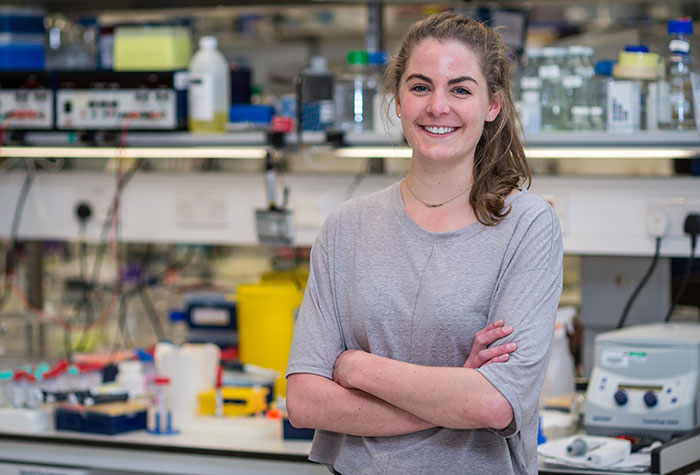
When the LMB Director, Jan Löwe, ran an internal video competition for staff and students to submit ideas for new films about life at the LMB, PhD student Karen Duffy suggested filming her day. One of four winning entries, Karen’s idea was to show what she sees during a typical day, to give people a sense of what a PhD student spends their time on and what their day looks like.
In March 2020, wearing a small video camera strapped to her head, Karen takes us from her home, to early morning rowing training on the river Cam, cycling the streets of Cambridge, and to the LMB where she is a student in Philipp Holliger’s group in the LMB’s Protein and Nucleic Acid Chemistry Division. Here, Karen undertakes a variety of experimental work, enjoys coffee and lunchtime discussions with colleagues in the LMB restaurant, then continues with her benchwork before capping off her day with a pub dinner with some friends. The video has been sped up and compressed into three minutes to give a quick snapshot of the whole day.
Karen grew up outside Boston, USA, and majored in biological engineering at Cornell University. After also completing a Masters of Engineering there, she spent three years working in pharma and biotech in Boston before deciding to further develop her skills as a scientist and expand her career opportunities by doing a PhD. She chose to continue her studies at the LMB in Cambridge:
“I was interested in doing my PhD abroad, and had visited Cambridge and very much liked the intellectual atmosphere and excitement. The LMB has top-notch facilities, resources, and an environment and structure that enables students to tackle big research questions in a really unique way.”
Karen studies the enzymes, polymerases, that make DNA. The Holliger group is working to engineer these enzymes to accept modified building blocks in order to create different forms of modified DNA. These types of modified DNA have many applications in biotechnology, medicine, and material science. For example, the human body has strong natural defenses, and can efficiently chop up foreign DNA molecules within minutes of their entering the body. The group’s modified forms of DNA can evade these natural mechanisms so that the DNA molecules can survive long enough in the body to exert therapeutic effects. In fact, several therapeutics made of RNA or DNA have been approved and all of these are modified in some way, underlining just how essential such modifications are for biostability.
“I’ve always been interested in using our knowledge of biological systems to create new tools or to solve problems. The thing I find most exciting about my work is the potential for translation to therapeutic contexts. It keeps me motivated thinking that one day this work could contribute to helping patients,” Karen explains.
Karen can identify certain key skills and attributes that have been helpful during her PhD as well as areas in which she has grown and developed. Her perseverance and natural optimism have been important, especially during stretches of the project where progress was slower. She also points to self-motivation and flexibility as important characteristics in PhD work, along with the ability to be detail oriented while also thinking of the big picture. She adds,
“Over the course of my PhD I’ve become more confident in my decisions and intuitions as a scientist. It was a privilege to work with such different people from all around the world, because I was exposed to people with really different ways of thinking and working, which was a great learning experience.”
Although the work undertaken in a PhD is, by nature, quite independent, there’s no denying that the people and culture in a lab can have a huge effect on the student experience. When asked what advice she would give to a prospective PhD student, she stresses the importance of choosing a PhD carefully, ensuring genuine interest in the project, strong motivation, and a good fit with the lab group and PI.
“I feel very fortunate to have had a great advisor that both gave me a lot of space and scientific freedom, but was also always available for a chat if I needed guidance. Also, post-docs in the lab were extremely generous with their time and advice, which made a huge difference, especially in getting me up and running with all the techniques at the beginning of my project.”
The support of various facilities at the LMB, such as the flow cytometry team, was also invaluable.
Away from the bench, Karen enjoyed taking part in the Graduate Student Association and being on the LMB’s Environmental Committee. She also joined the rowing team and was active in her college community. She credits having hobbies and friends outside the lab as being key in maintaining balance and her mental health.
On making her video, Karen thought it might be useful for prospective students to see how life might look, both in and outside the lab, as a PhD student at the LMB:
“It felt odd wearing a camera around all day, but it’s cool that I got to capture a snapshot of my life as a PhD student and I hope it is useful for other students considering the LMB!”
Further references
LMB YouTube channel
Philipp Holliger’s group page
LMB Students page
LMB Graduate Student Association